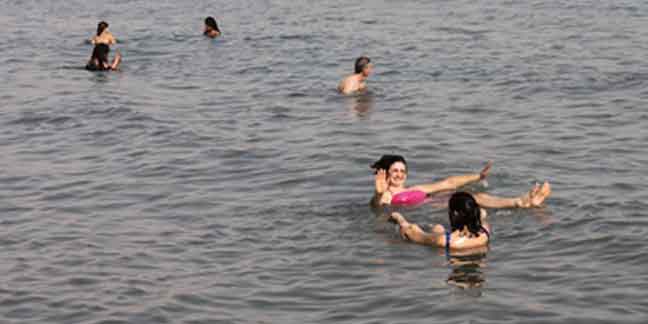
The temperature sat in the lower 80s when the pilgrims from the Diocese of Charlotte reached the Dead Sea on Saturday. Our tour guide, Arlette Kara’a, rattled off a list of instructions before floating on the intensely salt-filled body of water.
“Do not touch your eyes, try not to get any water in them, and if you get water in your mouth, seek first aid,” Kara’a instructed. The list continued. She ended by telling us to have fun.
Father Adrian Porras from St. Barnabas in Arden, who is leading the pilgrims, commented, “I’d rather sit on the beach and safely eat ice cream.”
And we passed him, doing just that as Letha Hinman, Lia Beard and I made our way to the water in our bathing suits. We met several members of our group by the shore, lifting mud from below the water and coating their legs and feet and faces.
We coated it all over our bodies -- thick, clay-like dark mud with sand and grittiness to it. It felt good on my legs, but stung the minute I put it to my face. I made two lines under my eyes, like eye black.
We started to walk into the water. It was cool, but not cold like the Atlantic Ocean is this time of year. It didn’t take any getting used to. The mud kept us warm as we walked on stones, sand and mud in the water. I commented on how unusual it felt not to be dodging seaweed and sea creatures.
We walked a bit deeper, a couple feet from the shoreline, and the other ladies turned around and lay back on the water like you would lay on a bed. And just like that, they were floating.
I felt fear, though. Despite seeing it, right before my eyes, I was never good at those team-building trust exercises where you fall back and someone catches you. So to trust in water felt unnatural to me.
I closed my eyes and lay back. I was floating. It felt surreal -- yet, peaceful.
I took the time to close my eyes for a minute and reflect. Unlike the Sea of Galilee, which is the setting for so many events of the Bible, the Dead Sea plays a smaller role in Scripture.
It served as a barrier, blocking traffic to Judah from the east. And Ezekiel prophesized that the Dead Sea would one day be fresh water and fishermen would cast their nets along its shore. That verse was read to us while we were on a cruise on the Sea of Galilee. While I floated there, I recalled how it felt to picture Jesus with the fishermen at Galilee.
There was a stronger current than I expected, and it pushed us a bit out to sea, but we didn’t dare venture too far out. Paddling like I was on a raft, I pushed myself closer to the shore.
As the mud started to wash off my body, I first noticed how smooth my legs felt against the water. Like silk, and softer than I ever remember feeling them.
To pose for a picture, Kara’a told me to put my hands behind my head, but as I did the wind caught me and nearly tipped me over. A drop of salt water splashed into my face. I could smell and taste the salt. Pungent. So much so that it nearly made me sick.
We waded back to the shore and decided to put on some more mud, now that we knew exactly how healing and exfoliating the mud could be.
After another few minutes of floating, I could feel myself getting dehydrated -- one of the things Kara’a said would happen quickly. Getting out of the water, I rubbed my fingers along my skin. My hands felt like butter. My arms as soft as my baby boy’s.
As we made our way across the seashell-free beach, I noticed that the two little blisters that I formed during our hike earlier that morning around Masada had dried up. My feet, which were obviously tired from five days of intense walking, felt better than when I leave a pedicure.
Something about the air and the mud and saltwater bath rejuvenated me. I was not tired from the hectic pace of all the holy sites, little sleep and a seven-hour time change. But fresh. Happy. And renewed inside and out.
— Kimberly Bender, online reporter
Follow along with the pilgrims
See lots of photos, quotes, reflections, faith facts and videos from the Holy Land as the pilgrims walk in the footsteps of Jesus. Join the virtual pilgrimage: http://lentholyland.tumblr.com/


